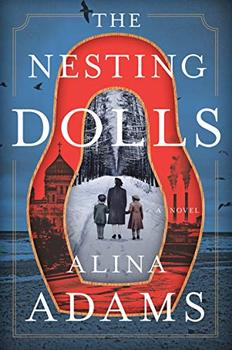Summary | Excerpt | Reviews | Beyond the Book | Read-Alikes | Genres & Themes | Author Bio

Critics' Opinion:
Readers' Opinion:
First Published:
Jul 2020, 384 pages
Paperback:
Jul 2021, 400 pages
 Book Reviewed by:
Book Reviewed by:
Jordan Lynch
Buy This Book
This article relates to The Nesting Dolls
 In The Nesting Dolls, Natasha dreams of entering the mathematics program at Odessa University. However, after correctly solving all of the initial equations on her entrance exam, she is presented with an additional equation, one that seems impossible to answer. When she cannot answer it, Natasha is failed and refused admission. Heartbroken, she learns that she was given a "Jewish problem," also known as a "coffin problem" or "killer problem," a type of equation specifically designed to keep Jewish students from enrolling at the university. Although The Nesting Dolls is fiction, Natasha's experience was a form of anti-Semitic discrimination faced by many Soviet Jewish students in the 1970s and '80s.
In The Nesting Dolls, Natasha dreams of entering the mathematics program at Odessa University. However, after correctly solving all of the initial equations on her entrance exam, she is presented with an additional equation, one that seems impossible to answer. When she cannot answer it, Natasha is failed and refused admission. Heartbroken, she learns that she was given a "Jewish problem," also known as a "coffin problem" or "killer problem," a type of equation specifically designed to keep Jewish students from enrolling at the university. Although The Nesting Dolls is fiction, Natasha's experience was a form of anti-Semitic discrimination faced by many Soviet Jewish students in the 1970s and '80s.
Coffin problems were used to prevent admission of Jewish students to mathematics programs, including the one at Moscow State University, one of the most prestigious schools in the USSR. These equations were constructed to be nearly impossible to solve, requiring a level of knowledge far beyond what a typical high school student would possess, but would have seemingly simple solutions. This design allowed universities to make it seem that they were administering entrance exams ethically while actively working to not admit Jewish students. These problems were also used in the entrance exams of other students deemed undesirable, including those who weren't part of the Komsomol, the political youth organization run by the country's Communist party.
A Soviet university's entrance exam was typically composed of a written and an oral portion. For the oral exam, a candidate would select a paper with pre-written equations to be solved. When finished, the student would alert an examiner, who would ask a follow-up question and check over the solutions. However, if the student was known or suspected to be Jewish, they would often be presented with a coffin problem as a follow-up question, with additional problems being given as necessary until they failed to answer correctly. They would then receive a failing score, which would serve to justify the rejection of their application. Coffin problems were just one common tool for anti-Semitic discrimination; sometimes students would be verbally drilled on their mathematical knowledge until they made a mistake, and others were given failing scores based on technicalities. All of these tactics allowed universities to prevent Jewish applicants from moving on to the upper echelons of academia in Soviet society.
In 2011, Tanya Khovanova, a Soviet-born mathematician, released a list of these coffin problems and their solutions to demonstrate the difficulty of the equations. Almost 40 years before, Khovanova had been a member of the Soviet team for the International Mathematical Olympiad, which was comprised of the eight math students considered to be the best in the Soviet Union. Valera Senderov, a teacher in Moscow, had enlisted the team to solve the problems as part of an effort to help train Jewish students to gain entrance to universities. The team worked on the problems for a month yet was only able to solve half of those on the list. According to Khovanova, the problems seem less difficult to solve today, as some of the ideas and premises used to solve them have become more standardized. However, the more limited knowledge available at the time and the pressure under which the problems were administered to students virtually ensured their failure and contributed to keeping Soviet Jews from achieving positions of power and prestige.
The use of coffin problems to strictly control enrollment lasted until the late 1980s, when the practice was openly discussed by administrators and ended. There is no way to determine to what degree the world of academia in the Soviet Union and the world as a whole was hindered by this exclusion of gifted minds. Through Natasha's story, The Nesting Dolls shows not only the discrimination and oppression Jewish students faced in pursuit of higher education but also hints at what could have been if brilliant mathematicians such as Natasha had been allowed to chase their dreams.
Moscow State University in March 2013, by Fred Schaerli (CC BY-SA 4.0)
Filed under Society and Politics
![]() This "beyond the book article" relates to The Nesting Dolls. It originally ran in August 2020 and has been updated for the
July 2021 paperback edition.
Go to magazine.
This "beyond the book article" relates to The Nesting Dolls. It originally ran in August 2020 and has been updated for the
July 2021 paperback edition.
Go to magazine.





The Funeral Cryer by Wenyan Lu
Debut novelist Wenyan Lu brings us this witty yet profound story about one woman's midlife reawakening in contemporary rural China.
Your guide toexceptional books
BookBrowse seeks out and recommends the best in contemporary fiction and nonfiction—books that not only engage and entertain but also deepen our understanding of ourselves and the world around us.